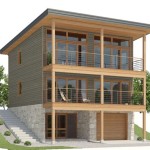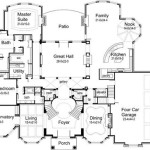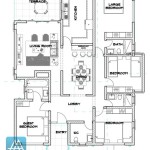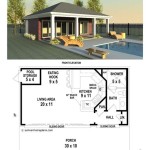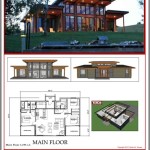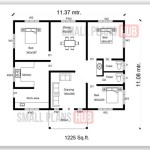Cost of Architect to Draw House Plans: A Comprehensive Overview
Embarking on a new home construction or significant renovation project involves a multitude of decisions, one of the most important being the creation of detailed house plans. These plans serve as a roadmap for the entire project, ensuring that the final result aligns with the homeowner's vision and complies with all relevant building codes and regulations. While some homeowners opt for pre-designed plans, engaging an architect to draw custom house plans offers numerous advantages, notably the ability to tailor the design to specific needs, site conditions, and aesthetic preferences. However, this personalized service comes at a cost, and understanding the factors that influence the price of architectural services is crucial for effective budget planning.
The cost of hiring an architect to draw house plans can vary significantly depending on several variables, making it challenging to provide a single, definitive price. These variables range from the complexity of the design and the size of the project to the architect's experience and geographic location. Homeowners should be prepared to conduct thorough research and obtain multiple quotes to accurately assess the potential expenses involved in this crucial phase of the building process. A comprehensive understanding of the pricing structures employed by architects, coupled with a clear articulation of project requirements, will facilitate a more informed decision-making process and help avoid unexpected costs down the line.
Understanding Architectural Fee Structures
Architects typically employ one of several fee structures when pricing their services. Each method has its own advantages and disadvantages, and the most suitable option will depend on the scope and nature of the project. The most common fee structures include percentage-based fees, hourly rates, fixed fees, and cost per square foot.
Percentage-Based Fees: This method calculates the architect's fee as a percentage of the total construction cost. The percentage typically ranges from 8% to 15% for residential projects, although it can be higher or lower depending on the project's complexity and the architect's experience. While this approach offers transparency and aligns the architect's interests with the homeowner's (as a higher construction cost translates to a larger fee), it can be difficult to accurately estimate the total construction cost at the outset of the project. This uncertainty can make budgeting a challenge. It also incentivizes the architect to allow for higher construction cost, as the fee is directly proportional to it.
Hourly Rates: With this structure, the architect charges an hourly rate for their time spent on the project. Hourly rates typically range from $100 to $250 or more, depending on the architect's experience and location. This method is often suitable for smaller projects or when the scope of work is not clearly defined at the beginning. However, it can be difficult to predict the total cost of architectural services, as the amount of time required to complete the project may vary considerably. Detailed time tracking and regular communication between the architect and homeowner are crucial to managing costs effectively.
Fixed Fees: A fixed fee, also known as a lump-sum fee, is a pre-determined amount that the architect charges for a specific set of services. This approach offers budget certainty and is often used for projects with a well-defined scope. However, fixed fees may be less flexible than other fee structures, and any changes to the project requirements may result in additional charges. It's essential to have a detailed contract that clearly outlines the scope of services included in the fixed fee.
Cost Per Square Foot: This method calculates the architect's fee based on the square footage of the house being designed. The cost per square foot typically ranges from $2 to $10 or more, depending on the complexity of the design and the architect's experience. This approach is relatively simple to understand and provides a quick estimate of the potential cost of architectural services. However, it may not accurately reflect the complexity of the design or the level of detail required. Projects with intricate detailing or unusual features may warrant a higher cost per square foot than simpler designs.
Understanding the nuances of each fee structure allows homeowners to have informed conversations with potential architects and select a pricing method that aligns with their budgetary constraints and project requirements. It's also important to clarify what services are included in the quoted fee and whether any additional expenses, such as travel costs or permit fees, will be billed separately.
Factors Influencing the Cost of Architectural Services
Several factors can influence the cost of hiring an architect to draw house plans. These factors relate to the complexity of the design, the size of the project, the architect's experience, and geographic location. Understanding how these factors impact pricing helps homeowners to anticipate potential costs and negotiate effectively with architects.
Complexity of the Design: Intricate designs with unusual features, such as curved walls, custom millwork, or complex rooflines, require more time and expertise than simpler designs. These complexities often translate to higher architectural fees, regardless of the pricing structure employed. Designs that require extensive structural engineering calculations or specialized detailing will also increase the overall cost. Homeowners should be prepared to pay a premium for highly customized or unique designs.
Size of the Project: Larger houses typically require more time and effort to design, resulting in higher architectural fees. This is particularly true when using percentage-based or cost-per-square-foot pricing structures. The additional square footage necessitates more detailed drawings, more extensive site analysis, and potentially more complex mechanical and electrical systems. Even with hourly rates, bigger projects usually require greater input from the architect and hence higher totals.
Architect's Experience and Reputation: Highly experienced and reputable architects typically charge higher fees than less experienced architects. Their expertise and proven track record can provide valuable insights and ensure a successful project outcome. However, it's important to weigh the benefits of hiring a seasoned architect against the increased cost. Junior architects or less well-known firms can often provide excellent service at a more affordable price. Verifying licenses, checking references, and reviewing portfolios are essential steps in selecting an architect, regardless of their experience level.
Geographic Location: Architectural fees can vary significantly depending on geographic location. Architects in major metropolitan areas or regions with high construction costs typically charge more than architects in smaller towns or rural areas. This difference in pricing reflects the higher cost of living and operating expenses in these areas. Homeowners should research the typical architectural fees in their local market to get a realistic estimate of the potential costs.
Scope of Services:The amount of services that an architect will provide also determines the cost of drawing house plans. Standard services include schematic design, design development, construction documents, bidding and negotiation, and construction administration, but not all homeowners require the full range of services.
Considering these factors helps homeowners understand the complexities of architectural pricing and make informed decisions about their project budget. Open communication with potential architects and a clear understanding of the project requirements are essential for obtaining accurate quotes and avoiding unexpected costs.
Tips for Managing Architectural Costs
While hiring an architect can be a significant investment, there are several strategies that homeowners can employ to manage costs effectively. These strategies include careful planning, value engineering, and open communication with the architect throughout the design process.
Careful Planning and Scope Definition: Clearly defining the project requirements and creating a detailed program before engaging an architect can help minimize design changes and reduce overall costs. A well-defined scope of work allows the architect to provide a more accurate quote and avoid unnecessary revisions. Homeowners should consider their long-term needs and lifestyle preferences when creating the project program. This is because changes later in the process can be very expensive.
Value Engineering: Value engineering involves exploring alternative materials, construction methods, or design features that can reduce costs without compromising the quality or functionality of the building. An experienced architect can provide valuable insights and suggest cost-effective solutions. For example, using standardized window sizes or simplifying the roof design can significantly reduce construction costs. This also involves considering the life-cycle costs of design and construction decisions, as decisions may affect maintenance requirements, energy consumption, and overall lifespan.
Open Communication: Maintaining open and transparent communication with the architect throughout the design process is crucial for managing costs effectively. Regular meetings and clear communication channels allow homeowners to stay informed about the project's progress and address any potential issues promptly. Homeowners should not hesitate to ask questions or express concerns about the design or budget. Frequent updates can keep all parties up to date and aware of current progress, as well as potential problems.
Negotiate Fees: Negotiation is a standard practice when hiring an architect. Homeowners should not be afraid to negotiate the architect's fees, especially when using percentage-based or hourly rate pricing structures. Obtaining multiple quotes from different architects provides leverage for negotiation and allows homeowners to compare pricing structures and services. However, it's important to remember that the lowest price does not always guarantee the best value. Consider the architect's experience, reputation, and portfolio when making a decision. A slightly higher fee may be justified if the architect has a proven track record of delivering high-quality designs and managing projects effectively. Furthermore, ensure that the fee structure is clearly outlined in a contract to avoid misunderstandings later on.
Phased Approach: Consider breaking the project into phases. This can involve an architect creating the initial design and construction drawings, but the homeowner manages the construction process independently. This can provide cost control and oversight, but requires significant time and expertise on the part of the homeowner.
By implementing these strategies, homeowners can effectively manage architectural costs and ensure that their project stays within budget. While the cost of hiring an architect can be a significant investment, the benefits of a well-designed and properly executed house plan often outweigh the initial expense.

Fixr Com 2024 Architect Cost Of To Draw House Plans

Floor Planner Cost Hiring Draftsperson Forbes Home

How Much Does A Floor Plan Cost

How Much Does A Floor Plan Cost

How Much Do 3d House Plans Cost Faqs Answered Cedreo

House Plan Cost Engineer And Architect Fees For Planning 3d Model 2024

How Much Does An N Architect Charge On Average For A House Plan Of 30x50 What Is Included

Charges

Fixr Com 2024 Architect Cost Of To Draw House Plans

Cost Of Architect To Draw House Plans Facts Know Before Hiring
Related Posts

